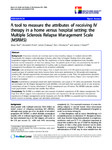A tool to measure the attributes of receiving IV therapy in a home versus hospital setting: the Multiple Sclerosis Relapse Management Scale (MSRMS)
| dc.contributor.author | Riazi, A | |
| dc.contributor.author | Porter, B | |
| dc.contributor.author | Chataway, J | |
| dc.contributor.author | Thompson, AJ | |
| dc.contributor.author | Hobart, JC | |
| dc.date.accessioned | 2018-08-13T12:26:59Z | |
| dc.date.available | 2018-08-13T12:26:59Z | |
| dc.date.issued | 2011-12 | |
| dc.identifier.issn | 1477-7525 | |
| dc.identifier.issn | 1477-7525 | |
| dc.identifier.other | 80 | |
| dc.identifier.uri | http://hdl.handle.net/10026.1/12038 | |
| dc.description.abstract |
<jats:title>Abstract</jats:title> <jats:sec> <jats:title>Background</jats:title> <jats:p>Intravenous steroids are routinely used to treat disabling relapses in multiple sclerosis (MS). Theoretically, the infusion could take place at home, rather than in hospital. Findings from other patient populations suggest that patients may find the experiences of home relapse management more desirable. However, formal comparison of these two settings, from the patients' point of view, was prevented by the lack of a clinical scale. We report the development of a rating scale to measure patient's experiences of relapse management that allowed this question to be answered confidently.</jats:p> </jats:sec> <jats:sec> <jats:title>Methods</jats:title> <jats:p>Scale development had three stages. First, in-depth interviews of 21 MS patients generated a conceptual model and pool of potential scale items. Second, these items were administered to 160 people with relapsing-remitting MS. Standard psychometric techniques were used to develop a scale. Third, the psychometric properties of the scale were evaluated in a randomised controlled trial of 138 patients whose relapses were managed either at home or hospital.</jats:p> </jats:sec> <jats:sec> <jats:title>Results</jats:title> <jats:p>A preliminary conceptual model with eight dimensions, and a pool of 154 items was generated. From this we developed the MS Relapse Management Scale (MSRMS), a 42-item with four subscales: access to care (6 items), coordination of care (11 items), information (7 items), interpersonal care (18 items). The MSRMS subscales satisfied most psychometric criteria but had notable floor effects.</jats:p> </jats:sec> <jats:sec> <jats:title>Conclusions</jats:title> <jats:p>The MSRMS is a reliable and valid measure of patients' experiences of MS relapse management. The high floor effects suggest most respondents had positive care experiences. Results demonstrate that patients' experiences of relapse management can be measured, and that the MSRMS is a powerful tool for determining which services to develop, support and ultimately commission.</jats:p> </jats:sec> | |
| dc.format.extent | 80- | |
| dc.format.medium | Electronic | |
| dc.language | en | |
| dc.language.iso | eng | |
| dc.publisher | Springer Science and Business Media LLC | |
| dc.subject | Adolescent | |
| dc.subject | Adult | |
| dc.subject | Aged | |
| dc.subject | Female | |
| dc.subject | Home Care Services | |
| dc.subject | Humans | |
| dc.subject | Infusions, Intravenous | |
| dc.subject | Interviews as Topic | |
| dc.subject | Male | |
| dc.subject | Middle Aged | |
| dc.subject | Multiple Sclerosis, Relapsing-Remitting | |
| dc.subject | Outcome and Process Assessment, Health Care | |
| dc.subject | Outpatients | |
| dc.subject | Patient Satisfaction | |
| dc.subject | Psychometrics | |
| dc.subject | Reproducibility of Results | |
| dc.subject | Steroids | |
| dc.title | A tool to measure the attributes of receiving IV therapy in a home versus hospital setting: the Multiple Sclerosis Relapse Management Scale (MSRMS) | |
| dc.type | journal-article | |
| dc.type | Comparative Study | |
| dc.type | Journal Article | |
| dc.type | Randomized Controlled Trial | |
| dc.type | Research Support, Non-U.S. Gov't | |
| plymouth.author-url | https://www.webofscience.com/api/gateway?GWVersion=2&SrcApp=PARTNER_APP&SrcAuth=LinksAMR&KeyUT=WOS:000295807800001&DestLinkType=FullRecord&DestApp=ALL_WOS&UsrCustomerID=11bb513d99f797142bcfeffcc58ea008 | |
| plymouth.issue | 1 | |
| plymouth.volume | 9 | |
| plymouth.publication-status | Published | |
| plymouth.journal | Health and Quality of Life Outcomes | |
| dc.identifier.doi | 10.1186/1477-7525-9-80 | |
| plymouth.organisational-group | /Plymouth | |
| plymouth.organisational-group | /Plymouth/Faculty of Health | |
| plymouth.organisational-group | /Plymouth/Faculty of Health/Peninsula Medical School | |
| plymouth.organisational-group | /Plymouth/REF 2021 Researchers by UoA | |
| plymouth.organisational-group | /Plymouth/REF 2021 Researchers by UoA/UoA03 Allied Health Professions, Dentistry, Nursing and Pharmacy | |
| plymouth.organisational-group | /Plymouth/Research Groups | |
| plymouth.organisational-group | /Plymouth/Research Groups/Institute of Translational and Stratified Medicine (ITSMED) | |
| plymouth.organisational-group | /Plymouth/Research Groups/Institute of Translational and Stratified Medicine (ITSMED)/CCT&PS | |
| plymouth.organisational-group | /Plymouth/Users by role | |
| plymouth.organisational-group | /Plymouth/Users by role/Academics | |
| dc.publisher.place | England | |
| dcterms.dateAccepted | 2011-09-26 | |
| dc.identifier.eissn | 1477-7525 | |
| dc.rights.embargoperiod | Not known | |
| rioxxterms.versionofrecord | 10.1186/1477-7525-9-80 | |
| rioxxterms.licenseref.uri | http://www.rioxx.net/licenses/all-rights-reserved | |
| rioxxterms.licenseref.startdate | 2011-09-26 | |
| rioxxterms.type | Journal Article/Review |


